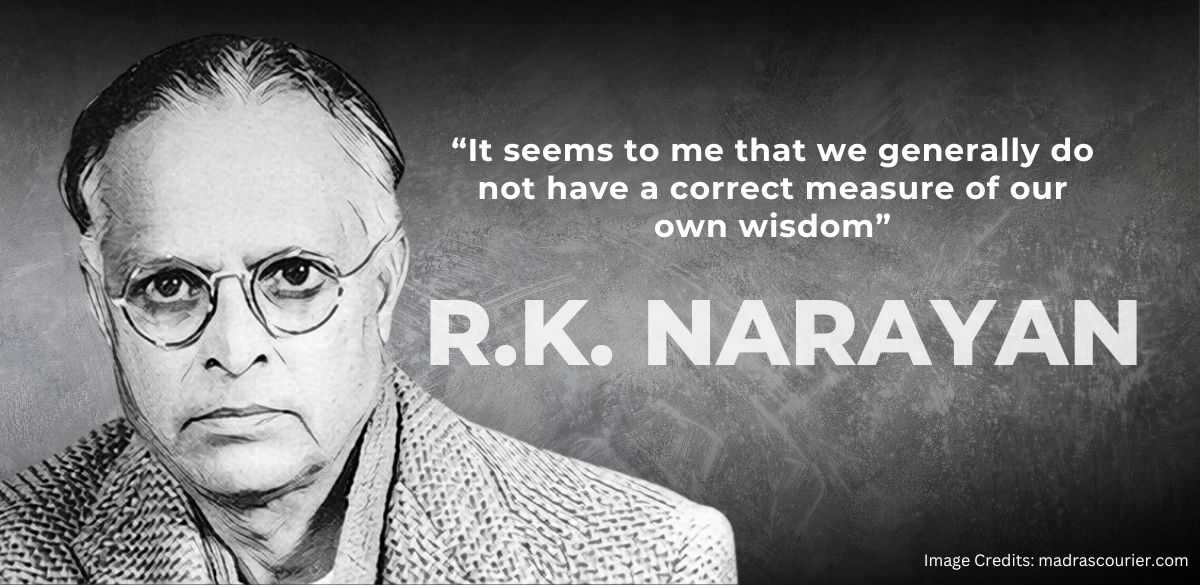Born on 10 October 1906, in Madras-then Chennai, to a Tamil-speaking Hindu family, R.K. Narayan was one of the most precious jewels India owned in literature. The particular story-telling diction Narayan moulded gave his imagination Malgudi, an imaginary town of which his novel and short-story characters come alive. The transformation of Narayan from being a curious lad who loved reading to becoming an internationally acclaimed author reflects a somewhat reclusive and unassuming writer who neither boasted of wanting to impress but told the truth of life simply and outright.
Table of Contents
The Early Years: Nurtured by Family and Books
His grandmother mostly brought up Narayan, as his father was a headmaster and would shift often. She fondly called him Kunjappa. Through his early education by his grandmother, he learned the great subjects of Sanskrit, arithmetic, and mythology. Narayan began his adolescence with an enthusiasm for the art of narration, as he began reading the works of Charles Dickens, Arthur Conan Doyle and P.G. Wodehouse, which proved an inspiration in his later writing.
Narayan’s childhood also afforded him the wealth of Indian culture, language, and folk tales. His was an unconventional family in more ways than one – they spoke English to each other at home most of the time but were steeped in Indian tradition. So much of this cannot help but blend into his work: the modern and yet the traditional dance across his pages, with Western influences conversing easily with Indian reality.
A Writer’s Journey Begins
After a rainy day of classes at Maharaja College, Mysore, Narayan understood that he was not cut out to be a writer after high school. He could not pass the university entrance exam and spent a year at home reading and writing before joining Maharaja College, Mysore. It took Narayan only a short time to understand where his genuine interest lay – in telling stories. He was a schoolteacher for a brief period, which did not turn out to be a promising stint. However, this phase of his life led him to what would eventually become his legacy: he decided to become a writer. This job raised many eyebrows but sowed in him seeds that remain undefeated.
Narayan completed his first novel by 1930, Swami and Friends. Different publishers rejected his first novel several times; however, a British author, Graham Greene, realised his potential and tried to get his book published. Swami and Friends introduced readers to Malgudi, an imaginary South Indian town that became the backdrop of many of Narayan’s works. Malgudi was a microcosm of Indian society people, their everyday lives, struggles, and joys, making it relatable to readers all over the globe.
The Master of Simplicity
Narayan’s strength was in simplicity—his ability to tell stories about ordinary people facing life’s ordinary challenges. He did not speak of great epics or political commentaries. Instead, his stories dealt with the relatable, the human, and the ordinary. He could find extraordinary stories about human nature, relationships, and moral dilemmas in the ordinary. His characters were not heroes or villains but persons anyone might find in any small town involved in universal experiences of love, loss, and identity.
His novel, The Bachelor of Arts, dissected the adolescent mind growing into adulthood, while The Dark Room confronted the little-discussed issue in the Indian social matrix-disharmony at home. Narayan’s brilliance was his ability to present all this with the utmost subtlety and, with a dash of humour and irony, touched the hearts of readers from all walks of life.
Tragedy and Triumph
The death of Narayan’s wife, Rajam, in 1939 was quite a turning point in his life and work. Himself, he has been known to be deeply affected, and in fact, he channelled his grief into writing. The English Teacher, one of his notable works, is an autobiographical account of this period. It revealed the emotional depth of Narayan’s mind and spiritual reflection throughout.
The personal adversities could not dampen Narayan’s literary career. His subsequent two novels, The Financial Expert and Waiting for the Mahatma, brought further plaudits and placed him at par with India’s foremost novelists. In 1960, he was given the Sahitya Akademi Award for his novel The Guide, an ongoing tale that sealed his position as one of the significant and most prominent literary figures in the field, entwining spirituality with love and humanity’s fragility.
The Legacy of Malgudi
He wrote extensively for over six decades; he has been translated into so many languages that, for all practical purposes, he became a global ambassador of Indian literature. His fictional creation, Malgudi, is a cultural reference point today as a testament to the timeless appeal of his work immortalised in the dear-to-heart TV series Malgudi Days.
Narayan passed away in 2001, but the stories he has woven over centuries live on. Narayan captured the essence of Indian life in simple yet profoundly meaningful narratives, ensuring that he will forever remain one of the great storytellers of India and the world.
The post R.K. Narayan: The Storyteller Who Captured the Soul of India appeared first on The Talented Indian.
